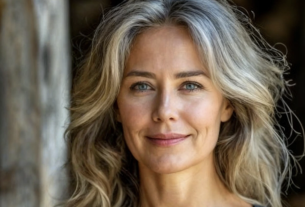— Again the whole apartment smells of vanilla; there’s no air to breathe,”—Raisa Pavlovna’s voice, sharp and dry like last year’s leaf, broke into the kitchen before she herself did, shattering the focused working atmosphere.
Anya didn’t flinch. She only gripped the offset spatula a little tighter, continuing with surgical precision to smooth the snow-white frosting on the top tier of a massive wedding cake. The air in the kitchen really was thick and sweet, saturated with the aromas of chocolate sponge, cream cheese, and almond extract. To her it was the smell of a job well done, the smell of money. To her mother-in-law—it was just one more reason to complain.
“Anyechka, hi! We’re here!” Alyosha announced brightly as he followed his mother in. He set a grocery bag on the floor and gave his wife an apologetic smile, as if to say he was sorry he once again couldn’t come alone.
“Hello, Raisa Pavlovna. Hi,” Anya didn’t turn; her eyes were fixed on the cake. Any extra movement could ruin the perfect geometry. “Take off your shoes, come in. I’ll put the kettle on in a second.”
“I don’t need your tea,” the mother-in-law waved her off, already letting her proprietorial gaze sweep over the kitchen. Her sharp eye immediately caught the fine dusting of powdered sugar on the countertop. “Once again you’ve smeared everything here with flour. Alyoshenka could use some hot soup, real food, and instead there’s a confectionery factory here all day long.”
Anya slowly ran the spatula along the cake’s side, taking off the excess cream. The motion was smooth, practiced—but there was hidden force in it, like a drawn bowstring. She kept silent. Arguing was pointless; she’d long since understood that. Any attempt to defend herself or her work was taken by Raisa Pavlovna as rudeness and disrespect to one’s elders.
“Mom, come on, stop it,” Alyosha tried to object feebly. “Anya’s working. It’s a big, expensive order.”
“Working…” Raisa Pavlovna snorted disdainfully, stepping closer and eyeing the cake’s intricate decorations with open skepticism. “It’s all toys. Money, money… A real woman should take care of her husband, make a cozy home, not spend nights bending over her sponges. Just look at yourself, Anya—so pale, with dark circles under your eyes.”
Alyosha shuffled awkwardly in the middle of the kitchen, transformed from a thirty-year-old man into a guilty teenager caught between two fires. His gaze darted from his mother’s stern face to his wife’s tense back. He wanted it all to just stop, for them to somehow work it out on their own without dragging him into it.
When Anya didn’t answer, Raisa Pavlovna resumed her inspection. She went to the table where the tools were laid out in perfect order: decorative piping tips, palette knives, silicone molds. She picked up a small metal fondant smoother, turned it in her fingers as if appraising it.
“And money goes for all this junk, imagine. So many little bits of metal… And look, some foreign berries. For the price of your berries, you could’ve bought a kilo of good tenderloin and fried cutlets for my son for a week.”
With tweezers Anya lifted a tiny sugar pearl and set it carefully onto the curving pattern of cream. Her fingers didn’t tremble. All her irritation, all her fury, flowed into this total concentration. She felt her neck muscles harden, her jaw clench from the effort not to turn around and say everything at once. But she kept silent, building a wall around herself of icy calm and professionalism.
“Mom, let me put the kettle on. Anya, do we have anything for tea?” Alyosha made another desperate attempt to change the subject, not realizing how absurd his question sounded to a woman standing in a kitchen covered with cakes and pastries.
“In the fridge, look,” Anya said shortly without turning. Her voice was even, but with a metallic edge.
“There, son, you hear?” Raisa seized on it at once, looking at Alyosha with a triumphant air. “Doesn’t even offer anything anymore, you have to look for it yourself. A wife should greet her husband from work with a smile and a hot dinner, not with her back and the smell of burnt sugar. Everything’s upside down in your home. Nothing’s done the right way.”
She delivered it with such a moralizing intonation it sounded like she was pronouncing sentence on their marriage. Anya froze for a moment; her hand with the spatula hung in the air. She exhaled slowly, set the tool down on the parchment, and picked up a damp wipe to clean her fingers. It had piled up. The cup was full and needed only a final drop.
Alyosha opened the fridge, and a cool breath mixed with the aroma of fresh berries flowed into the kitchen. He took out yesterday’s cheesecake—Anya had made it while testing a new recipe—and set it on the table. Raisa watched the movement with disapproval, as if he were taking out contraband. Her gaze slid past the perfect cake, past the neatly laid-out tools, and snagged on what stood in the corner in a specially cleared space. A big cardboard box had been carelessly opened, and beside it, gleaming with glossy cream-colored sides, stood a new stand mixer. It wasn’t just an appliance. It was a beast, a professional machine with a huge steel bowl and a massive body like some futuristic mechanism. To Anya it was a monument to success, and in her mother-in-law’s eyes—a monument to recklessness.
“Spending money on nonsense again,” Raisa clicked her tongue loudly. Her voice, which had merely been displeased before, now rang with righteous indignation. She approached the mixer without daring to touch it and jabbed a finger in its direction. “Imagine how much this costs! You’d be better off buying your husband a new shirt—look, his collar is already worn.”
That was the last drop. Heavy, poisonous, overflowing the cup of Anya’s patience. It wasn’t about a shirt or the mixer. It was about that belittling word—“nonsense.” In it was everything: the devaluing of her sleepless nights, her talent, her work—which had long brought more money into the family than Alyosha’s stable but dreary office job.
Cutting a slice of cheesecake, Alyosha merely grunted in agreement. He said nothing, but that quiet, compliant sound in support of his mother boomed in Anya’s ears like an alarm. It was betrayal. Quiet, everyday, and all the more vile for it. He hadn’t just failed to defend her; he had publicly agreed that what she did was “nonsense.”
Something inside Anya snapped—with a cold, deafening crack. She set the tweezers down on the parchment. Then she straightened slowly, feeling her cramped shoulders unfold. The polite mask of detachment she’d worn for years crumbled to dust. She turned. Not sharply, but with the frightening smoothness of a tank turret bringing its gun to bear.
Her eyes met her husband’s. Alyosha had just lifted a forkful of cheesecake and froze when he saw her face. He had never seen her like this: calm, but with an icy fire deep in her pupils that sent a chill down his spine. Raisa Pavlovna also fell silent, sensing the sudden shift in the air.
“Say one more time—either you or your mommy—that what I do is nonsense, and I will burn every piece of your fishing gear you waste half your salary on! Do you understand me, Alyosha?! My ‘hobby’ is what feeds us while you warm a chair in the office!”
Alyosha froze, mouth open, the fork still midway to his lips. His face lengthened, flashing through a whole spectrum of emotions—from puzzlement to outright shock. Raisa turned to stone; her pursed lips became a thin white line. She stared at her daughter-in-law as if the woman had suddenly started speaking an unknown language and breathing fire. Anya’s words hung in the thick vanilla air like gun smoke. And in that moment all three of them understood that the point of no return had been passed.
The petrified silence lasted exactly as long as it took the piece of cheesecake to slide off Alyosha’s fork and plop onto the clean floor, leaving a creamy smear. That quiet, sticky sound pulled them out of their stupor. Raisa was the first to recover. Her face, simply displeased before, flushed and then abruptly went pale. She sucked in air with a hiss, as if she’d been plunged into icy water.
“Alyosha! Do you hear me?! Do you hear what she’s saying?!” her voice broke into shrill, offended notes. She grabbed her son by the sleeve, as if seeking protection. “To me! Your mother! In your home! She’s threatening me! She… she…”
Alyosha finally lowered his hand with the empty fork. His face looked both bewildered and angry. He was used to Anya keeping quiet, enduring, deflecting with a joke, or retreating into her work like a shell. He didn’t know what to do with this new Anya—cold, direct, dangerous. Pushed by his mother’s hand and his own wounded ego, he tried to reclaim his authority.
“Anya, are you out of your mind? What kind of tone is that?” He tried to sound authoritative and stern, like the head of the family, but it came out strained and unsure. “Apologize to my mother. Now.”
Anya didn’t even look his way. She didn’t bother to answer them, as if they were nothing more than an annoying background noise, like the hum of the fridge. Instead, she turned and walked out of the kitchen. Her steps were calm and measured. There was no hurry, no theatrics. She simply walked away, and in every movement one thing was clear—her decision was made.
She passed them—standing in the middle of the kitchen like two absurd statues—and stepped into the hallway. Alyosha and Raisa exchanged a bewildered glance and followed, not understanding. Anya went to the tall built-in closet by the front door. It was Alyosha’s sanctuary, his personal altar. There, in perfect order, in special holders and cases, lay his pride—a collection of fishing gear. The smell of that closet—a mix of silicone lures, reel oil, and the faintest hint of dried river silt—was to Alyosha the scent of freedom and masculine competence.
Anya opened the door. Alyosha froze in the kitchen doorway. He saw her hand, without the slightest hesitation, reach inside and lay on his treasure. Not on some simple rod for crucian carp, but on an elite Japanese spinning rod made of high-modulus graphite. The very one he’d paid almost two salaries for, the one he showed his friends in reverent tones, praising its lightness and sensitivity.
She pulled the thin, almost weightless rod from its case. The black lacquered blank flashed under the dim hall light. Anya took it in both hands, as if evaluating it, and, with this trophy, returned to the kitchen. She stopped in the center, between the table with the unfinished cake and the husband and mother-in-law turned to stone.
Alyosha’s eyes flicked from her face to the precious spinning rod in her hands. His brain refused to accept what was happening. Raisa muttered something about ingratitude and insanity, but her words drowned in the thickening atmosphere of naked threat.
Anya didn’t brandish the rod, didn’t yell. She just held it, and that silence was scarier than any scene. Her calm was absolute—the calm of someone who has decided everything and is merely carrying out the sentence. She looked straight at her husband, and in her gaze there was neither fury nor hurt—only a cool, detached statement of fact.
“I’m not joking, Alyosha,” she said in the same flat, lifeless voice. “One more word. And you’ll be picking your gear out of the trash in pieces. Now see your mother out. I have work.”
Deliberately, she turned back to her cake, laying the rod on a free edge of the counter beside the powdered sugar. The gesture said more than words. She showed them that their presence was just an annoying obstacle to her, and that his most prized hobby was merely a hostage lying on the block awaiting her decision. The conversation was over. Perhaps forever.
For Alyosha, the world narrowed to three points. First—the cold, predatory gleam of the lacquered rod on the kitchen table beside the tools he had never tried to understand. Second—his mother’s angry, twisted face demanding immediate satisfaction. And third, the most important point—his wife’s straight, taut back as she ostentatiously returned to her work as if nothing had happened. That back radiated more threat than any shout. The air in the apartment grew dense, electrically charged like before a storm. The smell of vanilla mingled with the scent of ozone.
“Alyosha, are you just going to stand there?! She’s humiliating you! You and your mother!” Raisa yanked his sleeve so hard he staggered. Her whisper was louder than a scream. “Are you a man or what? Take your thing from her! Put her in her place!”
Alyosha looked at the rod. It wasn’t just a piece of graphite. It was Saturday mornings at the lake, the quiet lapping of water, the thrill of a bite, the respectful looks of his fishing buddies. It was his world, his outlet, his small patch of freedom into which someone was now intruding so brazenly. Anger surged in him, hot and muddy. He took a step forward, ready to snatch back his treasure, to shout, to prove who was master in the house.
But he stopped. He looked at Anya’s hands. The hands he had loved so much were now, with inhuman calm, picking up a piping bag. There wasn’t a hint of tremor in their movements. And he understood. She wasn’t bluffing. She wasn’t hysterical. She had exploded—but the blast had gone inward, turning her into a shard of ice. If he lunged now, she would, with that same icy calm, take his rod and snap it over her knee. And then, perhaps, break something else—not physically. Something far more important.
He saw the whole picture as if in slow motion: him grabbing the rod, her response, the quarrel, maybe a fight. All of it against the backdrop of a white, nearly finished wedding cake—an ironic symbol of love and harmony. And he realized he would lose. Not because she was stronger, but because unlike him she had nothing left to lose. She had already burned all the bridges in her mind. He was still standing on the bank, afraid to get his feet wet.
“Mom, let’s go,” he said hoarsely, without looking at her.
Raisa froze, not believing her ears. She let go of his sleeve as if scalded.
“What? What did you say? You’re… you’re siding with her? After all this?!”
“I said let’s go,” he repeated louder, turning to her. His eyes were pleading and tired. “Please. Let’s go.”
For her it was worse than a slap. It was betrayal in her value system. Her son, her precious Alyoshenka, hadn’t chosen her. He had chosen that… that pastry cook with her crazy cakes. Raisa’s face turned to stone. She shot her daughter-in-law—standing with her back to her—a look full of poison, then glanced at her son with contemptuous disappointment.
“I raised a son, not a doormat,” she spat, pivoted sharply, and marched to the door. “My feet will never set foot in this den again!”
She put on her shoes without sitting down and slammed the front door hard. Alyosha remained standing in the middle of the kitchen. The silence after the door slam was deafening. It pressed on his ears, making the sweet vanilla smell unbearably cloying. He looked at Anya’s back, bracing for anything—tears, reproaches, a renewed scene.
But Anya was silent. She carefully piped tiny cream roses along the cake’s bottom edge. Her world had narrowed again to work. She didn’t turn, didn’t say a word. As if he wasn’t even in the room.
Alyosha walked slowly to the table. His gaze fell on the rod. He reached out to take it, then stopped. He couldn’t just pick it up and carry it away as if nothing had happened. That gesture would now be tantamount to admitting defeat.
Anya finished the row of roses, set the bag aside. Then, still without a word, she took the rod. Alyosha tensed. She walked around the table, passed by him without a glance, and disappeared into the hallway. He heard the soft click of the closet door. She had put it back. Whole and unharmed.
When she returned to the kitchen, she took a clean cloth and wiped the cheesecake smear from the floor. Then she washed her hands and turned back to the cake. She hadn’t broken the rod. She hadn’t punished him. She simply showed him that she could. And that was scarier than any punishment. She gave him back his toy, but made it clear the rules of the game had changed forever. And now she was the one setting them.
Alyosha stood in the middle of his kitchen, in his own apartment, and for the first time in his life felt like a stranger. He looked at the woman he’d lived with for seven years and realized he didn’t know her at all. And the old Anya—the one who endured everything and silently put up with it—had died fifteen minutes ago. And he himself, together with his mother, had been her executioner…



